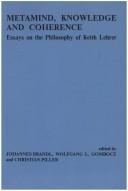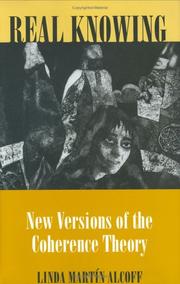| Listing 1 - 8 of 8 |
Sort by
|
Book
ISBN: 0198244010 Year: 1973 Publisher: Oxford Clarendon
Abstract | Keywords | Export | Availability | Bookmark
 Loading...
Loading...Choose an application
- Reference Manager
- EndNote
- RefWorks (Direct export to RefWorks)
Truth-Coherence theory --- Vérité comme cohérence --- Truth-Coherence theory. --- Vérité comme cohérence.

ISBN: 905183277X 9789051832778 Year: 1991 Volume: 40 Publisher: Amsterdam Rodopi
Abstract | Keywords | Export | Availability | Bookmark
 Loading...
Loading...Choose an application
- Reference Manager
- EndNote
- RefWorks (Direct export to RefWorks)
Metacognition. --- Philosophy of mind. --- Knowledge, Theory of. --- Truth --- Epistemics. --- Coherence theory. --- Truth - Coherence theory.

ISBN: 080143047X Year: 1996 Publisher: Ithaca (N.Y.): Cornell university press
Abstract | Keywords | Export | Availability | Bookmark
 Loading...
Loading...Choose an application
- Reference Manager
- EndNote
- RefWorks (Direct export to RefWorks)
Knowledge, Theory of --- Truth-Coherence theory --- Epistemology --- Theory of knowledge --- Philosophy --- Psychology
Book
ISBN: 1461951402 1438448198 9781461951407 9781438448190 9781438448176 1438448171 9781438448183 143844818X Year: 2013 Publisher: Albany State university of New York press
Abstract | Keywords | Export | Availability | Bookmark
 Loading...
Loading...Choose an application
- Reference Manager
- EndNote
- RefWorks (Direct export to RefWorks)
"Continues the author's discussion of the development of the Chinese philosophical concept Li, concluding in Song and Ming dynasty Neo-Confucianism"--Provided by publisher.
Truth --- Philosophy, Chinese. --- Li. --- Coherence theory of truth --- Chinese philosophy --- Confucian ethics --- Ethics --- Philosophy, Confucian --- Coherence theory. --- Li --- Philosophy, Chinese --- Coherence theory --- Truth - Coherence theory.
Book
ISBN: 9781438442891 9781438442884 1438442882 1438442890 Year: 2012 Publisher: Albany State University of New York Press
Abstract | Keywords | Export | Availability | Bookmark
 Loading...
Loading...Choose an application
- Reference Manager
- EndNote
- RefWorks (Direct export to RefWorks)
Providing a bracing expansion of horizons, this book displays the unsuspected range of human thinking on the most basic categories of experience. The way in which early Chinese thinkers approached concepts such as one and many, sameness and difference, self and other, and internal and external stand in stark contrast to the way parallel concepts entrenched in much of modern thinking developed in Greek and European thought. Brook Ziporyn traces the distinctive and surprising philosophical journeys found in the works of the formative Confucian and Daoist thinkers back to a prevailing set of assumptions that tends to see questions of identity, value, and knowledge--the subject matter of ontology, ethics, and epistemology in other traditions--as all ultimately relating to questions about coherence in one form or another. Mere awareness of how many different ways human beings can think and have thought about these categories is itself a game changer for our own attitudes toward what is thinkable for us. The actual inhabitation and mastery of these alternative modes of thinking is an even greater adventure in intellectual and experiential expansion.
Li. --- Philosophy, Chinese. --- Truth --- Coherence theory. --- Li --- Philosophy, Chinese --- Coherence theory of truth --- Chinese philosophy --- Confucian ethics --- Ethics --- Philosophy, Confucian --- Coherence theory --- S12/0217 --- S12/0430 --- China: Philosophy and Classics--Epistemology --- China: Philosophy and Classics--Neo-Confucianists: general and Song (including lixue 理學) --- Truth - Coherence theory.
Book
ISBN: 9782718609591 2718609591 Year: 2017 Publisher: Paris Editions Galilée
Abstract | Keywords | Export | Availability | Bookmark
 Loading...
Loading...Choose an application
- Reference Manager
- EndNote
- RefWorks (Direct export to RefWorks)
Notre hypothèse est la suivante : pour des raisons différentes et avec des méthodes différentes, Derrida et Goodman ont, chacun, ébranlé l’un des deux piliers qui sous-tendent l’essentiel de la tradition philosophique. Derrida, par le jeu subtil de la différence, a fait vaciller la vaste entreprise de mise en ordre. Goodman, par la profusion de mondes construits et irréductibles les uns aux autres, remet en cause l’aspiration à l’unité. Nous avons tenté d’établir que la métaphysique s’est développée dans une dialectique de l’un et de l’ordre, se rétablissant sur l’un de ses pilastres quand l’autre faiblissait. Si donc les soubassements de l’histoire philosophique devaient être revisités – peut-être révisés – il serait fructueux d’user simultanément des propositions derridiennes et goodmaniennes. C’est l’originalité de ce projet. Il s’agit, pour neutraliser la récupération dialectique par l’autre pilier (par l’unité quand l’ordre faillit ou par la mise en ordre dans la multitude s’immisce) d’interroger la tradition suivant le double impératif de la déconstruction et du nominalisme, suivant le double prisme du désordre de Derrida et du multiple de Goodman. Nous avons tenté d’établir que l’efficace d’une remise en cause du « mythe de l’un » ne peut se faire sans ébranler le « mythe de l’ordre ». Considérer conjointement les systèmes (ou des dé-systématisations) de Derrida et Goodman serait donc, suivant ce dessein, non seulement utile mais presque indispensable. Chacun d’eux permet d’éviter l'atrophie déstructurant du schème de l’autre. L’étude est menée à partir d’un inconfort partagé face au concept de vérité.
Derrida, Jacques, --- Goodman, Nelson --- --Derrida, Jacques, --- Criticism and interpretation --- Metaphysics --- Theory of knowledge --- Derrida, Jacques --- Order (Philosophy) --- Whole and parts (Philosophy) --- Derrida, Jacques. --- --Whole and parts (Philosophy) --- Truth --- Coherence theory --- Truth - Coherence theory --- Derrida, Jacques, - 1930-2004 --- Derrida, Jacques, - 1930-2004 - Criticism and interpretation --- Derrida, Jacques, 1930-2004
Book
ISBN: 0773422048 9780773422049 Year: 2010 Publisher: Lewiston Edwin Mellen Press
Abstract | Keywords | Export | Availability | Bookmark
 Loading...
Loading...Choose an application
- Reference Manager
- EndNote
- RefWorks (Direct export to RefWorks)
This book argues that Plato's Socrates subscribes to a coherence theory of truth, and according to that theory, there is only one fully consistent set of beliefs: the set which contains all and only true members. Thus, not only does inconsistency between two beliefs indicate that at least one of them is false, but the consistency of a belief with the other beliefs in the system suffices for its truth.
Plato. --- Socrates. --- Truth -- Coherence theory. --- Truth --- Philosophy & Religion --- Philosophy --- Coherence theory of truth --- Coherence theory --- Socrates --- Socrate --- Platon --- Plato --- Aflāṭūn --- Aplaton --- Bolatu --- Platonas --- Platone --- Po-la-tʻu --- Pʻŭllatʻo --- Pʻŭllatʻon --- Pʻuratʻon --- Πλάτων --- אפלטון --- פלאטא --- פלאטאן --- פלאטו --- أفلاطون --- 柏拉圖 --- 플라톤 --- Платон --- プラトン --- Sokrates --- Sokrat, --- Sokrates, --- Suqrāṭ, --- Su-ko-la-ti, --- Sugeladi, --- Sokuratesu, --- Sākreṭīsa, --- Socrate, --- سقراط, --- Σωκράτης,
Book
ISBN: 0415013100 0710212461 9780415013109 Year: 1988 Publisher: London Routledge and Kegan Paul
Abstract | Keywords | Export | Availability | Bookmark
 Loading...
Loading...Choose an application
- Reference Manager
- EndNote
- RefWorks (Direct export to RefWorks)
General ethics --- Emotivism --- Ethics --- Realism --- Truth --- Morale --- Réalisme --- Coherence theory --- Hobbes, Thomas, --- Hume, David, --- Kant, Immanuel, --- Ethics. --- Realism. --- Emotivism. --- Coherence theory. --- -Conviction --- Belief and doubt --- Philosophy --- Skepticism --- Certainty --- Necessity (Philosophy) --- Pragmatism --- Empiricism --- Universals (Philosophy) --- Conceptualism --- Dualism --- Idealism --- Materialism --- Nominalism --- Positivism --- Rationalism --- Deontology --- Ethics, Primitive --- Ethology --- Moral philosophy --- Morality --- Morals --- Philosophy, Moral --- Science, Moral --- Values --- Emotive theory of ethics --- Ethics, Emotive theory of --- Hobbes, Thomas --- -Hume, David --- -Kant, Immanuel --- -ヒューム --- -Coherence theory --- -Ethics --- Réalisme --- Coherence theory of truth --- Hume, David --- Kant, Immanuel --- Kant, Emmanuel --- Kant, Emanuel --- Kant, Emanuele --- Kant, I. --- Kānt, ʻAmmānūʼīl, --- Kant, Immanouel, --- Kant, Immanuil, --- Kʻantʻŭ, --- Kant, --- Kant, Emmanuel, --- Ḳanṭ, ʻImanuʼel, --- Kant, E., --- Kant, Emanuel, --- Cantơ, I., --- Kant, Emanuele, --- Kant, Im. --- קאנט --- קאנט, א. --- קאנט, עמנואל --- קאנט, עמנואל, --- קאנט, ע. --- קנט --- קנט, עמנואל --- קנט, עמנואל, --- كانت ، ايمانوئل --- كنت، إمانويل، --- カントイマニユエル, --- Kangde, --- 康德, --- Kanṭ, Īmānwīl, --- كانط، إيمانويل --- Kant, Manuel, --- Gobbs, Tomas, --- Hobbs, Thomas, --- Gobbes, Tomas, --- T. H. --- H., T. --- Hobs, Thomas, --- Hobbes, --- Hobbes, Thom. --- Hobbius, Thomas, --- Hobbuzu, Tomasu, --- Huobusi, --- Hobbs, Tho. --- הובס, תומס, --- 霍布斯, --- ホッブズ, トマス, --- Truth - Coherence theory.
| Listing 1 - 8 of 8 |
Sort by
|

 Search
Search Feedback
Feedback About UniCat
About UniCat  Help
Help News
News